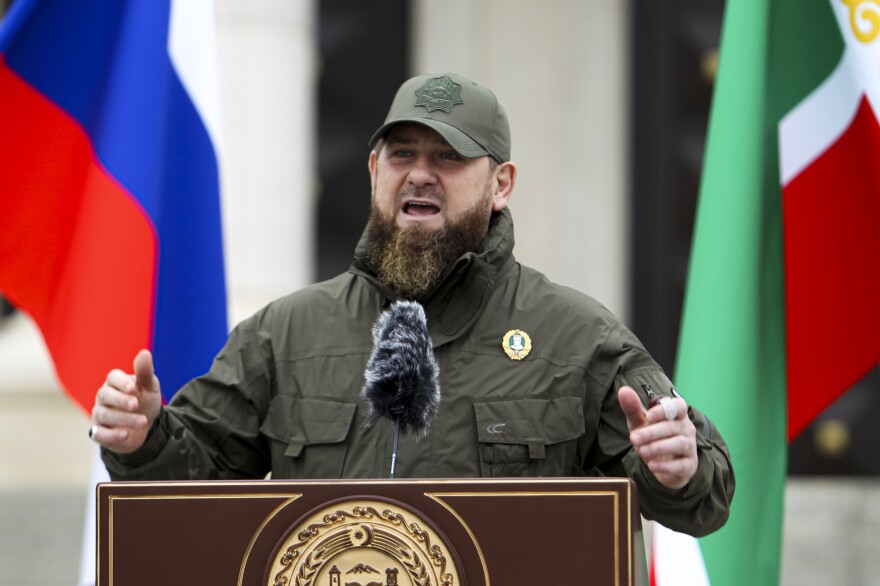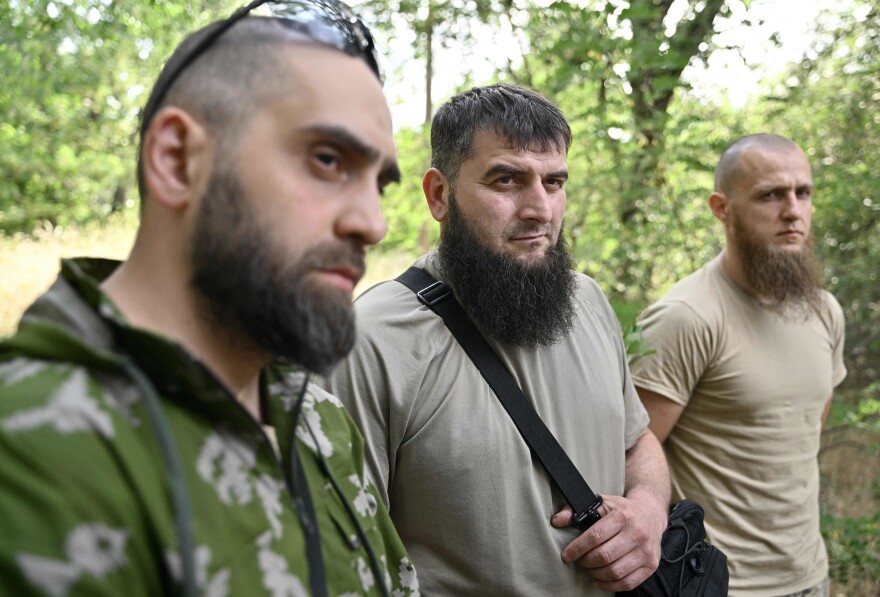ZAPORIZHZHIA, Ukraine — Mansur was 13 when Russian soldiers destroyed his village of Samashki during Chechnya's first war for independence against Russia.
Wielding flamethrowers, the Russians burned Mansur's neighbors alive in their homes, threw grenades into basements and executed men. Four years later, a truce disintegrated, and Mansur was back at war. He says he was never the same after.
"Russia ruined everything I had. I grew up with war, and the war shaped me in all respects," Mansur, 40, says matter-of-factly.
Mansur is one of more than 200,000 Chechens who fled to Turkey and Europe throughout the 2000s during a second war between Russian federal forces and fighters in Chechnya, a republic in far southern Russia.

Leaving his home didn't mean giving up on his fight against Russia. "If I had been born in America or Canada, I wouldn't come here to Ukraine. But because Russia took everything from me, I have to resist. Nothing else matters," Mansur says.
Today, Mansur is the deputy commander of the Sheikh Mansur Battalion (no relation), one of at least two all-Chechen battalions fighting in Ukraine against Russia. These Chechens are among the 20,000 foreign fighters that the Ukrainian government estimated to have joined its forces as of early March, near the start of Russia's invasion of Ukraine.
The Chechens say they are ready to fight Russian forces as well as against the other ethnic Chechen soldiers who have been sent to fight on behalf of Russia.
The pro-Kyiv Chechen fighters who spoke with NPR refused to disclose their numbers in Ukraine, citing security concerns, especially from Kremlin-backed Chechens. That is also why they gave only their first names or no name at all. But they do say their battalion numbers at least in the hundreds of men — all shaped by trauma and driven by hatred of Russia.
In Ukraine, Russian soldiers have shot civilians, indiscriminately shelled schools and apartment buildings and terrorized towns and villages they have occupied. However, Chechen soldiers say they were unfazed by these horrors. They believe they have already experienced much worse.
"The tragedies of Ukraine in Bucha and Mariupol are nothing compared to what we experienced growing up. The Russians leveled our cities and villages to the ground," says a second soldier in Mansur's battalion, who was born and raised in the Chechen capital of Grozny before it was destroyed by Russian bombing in the early 2000s.

Chechens have a history of clashes with Russians
Ethnic Russians and Chechens have clashed bitterly since the 18th century in periodic border conflicts. Russian imperial troops routinely plundered Chechen settlements in bloody ethnic cleanses against Chechen civilians. During Josef Stalin's rule of the Soviet Union, about 400,000 Chechens and ethnic Ingush were forcibly deported from their homeland in the North Caucasus. As many as 30% of people died from the hardship and violence of relocation, until the survivors were allowed to return to their land under Soviet leader Nikita Khrushchev 13 years later.
After the disintegration of the Soviet Union, Russia brutally quashed a nascent Chechen republic. The first war for independence ended in a peace armistice, only to dissolve in 1999 after Vladimir Putin, then Russia's prime minister, spearheaded a new military campaign in Chechnya allegedly for the sake of combating terrorists. Historians now say the allegation may have been exaggerated or fabricated.

"We were always betrayed and sold," says another Chechen soldier in Mansur's battalion. He did not give his name for security reasons. "From our very first liberation and the construction of our state, no one has ever helped us and they will not help."
They can't offer howitzers; only themselves, and years of experience fighting Russians
The Chechens say they are eager to pass on know-how from this experience fighting Russia for the last 20 years to the Ukrainian army. Unlike the U.S., they say, they have no howitzers or heavy weapons to give Ukraine. They can only give their bodies. Their lives as individuals matter little, the second soldier says.

"We lost our homeland. What more does a person have to lose? Our family or children are not important when we've lost our home, and the whole world was silent," he says.
The members of the Sheikh Mansur battalion say that matters in settling a 400-year-old blood feud, beginning in the 1700s, when Russian czars pushed into the North Caucasus where Chechens live.
"This is our dream. And we will pass this dream on from one generation to the next generations until this evil is destroyed," says the soldier.
Overall, Chechens are divided on whether to fight for or against Russia. In 2006, Moscow appointed pro-Russian leader Ramzan Kadyrov to rule Chechnya, and Kadyrov has pledged his support and loyalty to Putin and his invasion of Ukraine. Kadyrov has claimed that Chechen fighters loyal to Russia have been sent to Ukraine to fight for Putin, meaning it is entirely possible Chechens are now fighting Chechens.

No matter, says Mansur, they are playing the long game here.
"In czarist Russia, General Yermolov stole everything from us. But we survived him. Stalin died. Putin will die. We will outlive these people," he says.
He hopes he lives long enough to see 45-year-old Kadyrov perish as well.
Wherever Russia wages war in the world, Mansur says, his battalion would follow to fight it. Their only purpose in life now is to take up arms against Russia — wherever that might be.
Copyright 2022 NPR. To see more, visit https://www.npr.org.




